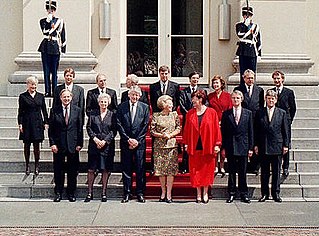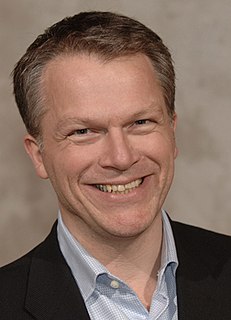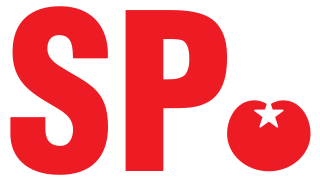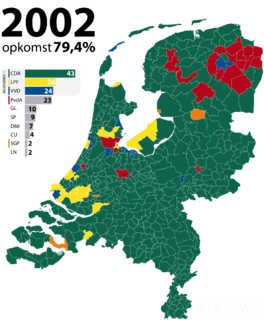
Willem "Wim" Kok was a Dutch politician who served as Prime Minister of the Netherlands from 22 August 1994 until 22 July 2002. He was a member of the Labour Party (PvdA).

The People's Party for Freedom and Democracy is a conservative liberal political party in the Netherlands.
The Labour Party is a social democratic political party in the Netherlands.

The politics of the Netherlands take place within the framework of a parliamentary representative democracy, a constitutional monarchy and a decentralised unitary state. The Netherlands is described as a consociational state. Dutch politics and governance are characterised by a common striving for broad consensus on important issues, within both of the political community and society as a whole.
The Christian Union is a Christian democratic political party in the Netherlands. The CU holds socially conservative positions on issues such as same-sex marriage, abortion and euthanasia, is Eurosceptic, while maintaining progressive stances on economic, immigration and environmental issues. The party self-describes itself as "social Christian".

The Second Kok cabinet, also called the Second Purple cabinet was the cabinet of the Netherlands from 3 August 1998 until 22 July 2002. The cabinet was formed by the political parties Labour Party (PvdA), People's Party for Freedom and Democracy (VVD) and the Democrats 66 (D66) after the election of 1998. The grand coalition (Purple) cabinet was a majority government in the House of Representatives and was a continuation of the previous cabinet Kok I. It was the last of two cabinets of Wim Kok, the Leader of the Labour Party as Prime Minister, with Annemarie Jorritsma of the People's Party for Freedom and Democracy and Els Borst the former Leader of the Democrats 66 serving as Deputy Prime Ministers.

Democrats 66 is a social-liberal political party in the Netherlands. Its name originates from the year in which it was founded.

The Second Balkenende cabinet was the cabinet of the Netherlands from 27 May 2003 until 7 July 2006. The cabinet was formed by the political parties Christian Democratic Appeal (CDA), People's Party for Freedom and Democracy (VVD) and the Democrats 66 (D66) after the election of 2003. The centre-right cabinet was a majority government in the House of Representatives.

Wouter Jacob Bos (Dutch pronunciation: [ˈʋʌutər ˈbɔs]; is a retired Dutch politician of the Labour Party and businessman. He is the designated CEO and Chairman for the government-owned Dutch Invest Agency taking office in 2019.

The Socialist Party is a left-wing, democratic socialist political party in the Netherlands.

General elections were held in the Netherlands on 15 May 2002. The elections were amongst the most dramatic in Dutch history, not just in terms of the electoral results, as they were completely overshadowed by the assassination of leader Pim Fortuyn only nine days before election day.

General elections were held in the Netherlands on 22 January 2003.
Liberalism in the Netherlands started as an anti-monarchical effort spearheaded by the Dutch statesman Thorbecke, who almost single-handedly wrote the 1848 Constitution of the Netherlands that turned the country into a constitutional monarchy.

General elections were held in the Netherlands on 3 May 1994. The Labour Party emerged as the largest party, winning 37 of the 150 seats in the House of Representatives. The election resulted in significant losses for both the Labour Party and the Christian Democratic Appeal. The two liberal parties, People's Party for Freedom and Democracy and Democrats 66 made large gains, whilst two pro-elderly parties and the Socialist Party all passed the electoral threshold to win seats.

General elections were held in the Netherlands on 22 November 2006 following the fall of the Second Balkenende cabinet. The elections proved relatively successful for the governing Christian Democratic Appeal (CDA) which remained the largest party with 41 seats, a loss of only three seats. The largest increase in seats was for the Socialist Party (SP), which went from nine to 25 seats. The main opposition party, the social-democratic Labour Party (PvdA) lost nine of its 42 seats, while the right-liberal People's Party for Freedom and Democracy (VVD) and the progressive liberal Democrats 66 lost a considerable portion of their seats, six of 28 and three of six, respectively. New parties, such as the right-wing Party for Freedom (PVV) of former VVD MP Geert Wilders and the animal rights party Party for the Animals (PvdD) were also successful, with the PVV winning nine seats and the PvdD winning two, thereby becoming the first animal rights group to enter a European parliament.

The First Kok cabinet, also called the First Purple cabinet was the cabinet of the Netherlands from 22 August 1994 until 3 August 1998. The cabinet was formed by the political parties Labour Party (PvdA), People's Party for Freedom and Democracy (VVD) and the Democrats 66 (D66) after the election of 1994. The grand coalition (Purple) cabinet was a majority government in the House of Representatives. It was the first of two cabinets of Wim Kok, the Leader of the Labour Party as Prime Minister, with Hans Dijkstal the Deputy Leader of the People's Party for Freedom and Democracy and Hans van Mierlo the Leader of the Democrats 66 serving as Deputy Prime Ministers.

Following the 2006 Dutch general election, held on November 22, a process of cabinet formation started, involving negotiations about which coalition partners to form a common programme of policy and to divide the posts in cabinet. On February 22, 2007 it resulted in the formation of the Fourth Balkenende cabinet.
Purple is a common term in politics for governments or other political entities consisting of parties that have red and blue as their political colours. It is of particular note in two areas: in the politics of the Netherlands and Belgium and in the politics of the United States.

Early general elections were held in the Netherlands on 12 September 2012 after Prime Minister Mark Rutte handed in his government's resignation to Queen Beatrix on 23 April. The 150 seats of the House of Representatives of the Netherlands were contested using party-list proportional representation. The People's Party for Freedom and Democracy (VVD) received a plurality of the votes, followed by the Labour Party (PvdA).

















